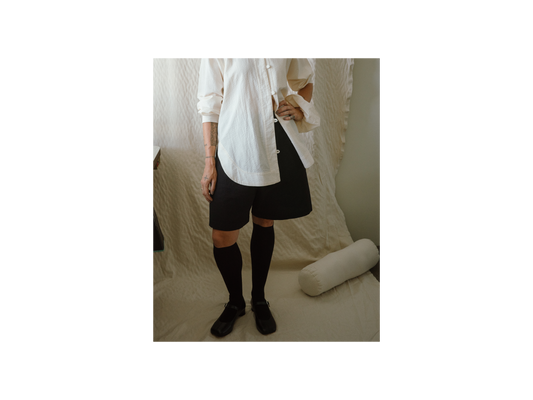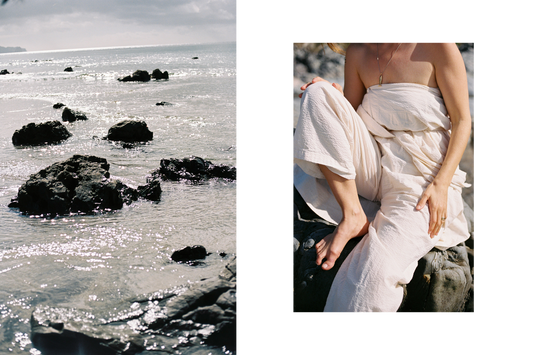Voice memo recorded and sent to Zoe and Guy walking back to Footscray train station after the Circular Fashion Now: Solutions event, hosted at A.BCH factory. 4.47pm Saturday 26th of October.

HB: Hi, okay, so it was really good - the whole conversation. I might write a report on this.
It was Courtney from A.BCH and Circular Sourcing, and her guest was Julie Boulton, who’s a sustainability expert. They're doing this project together, with a few other people, working with Country Road to make things more circular and whatever, it seems really, really cool.
So they were kind of having a discussion, and they were like, “put your hand up or just like, butt in whenever you want. Let's make this a conversation.” And I think I'm really learning. I found this at the Waste Expo as well, especially, after the Pocket Conversation with Guy and how he spoke about being small on purpose, and it being his superpower. How if people [in larger companies] can't include “you” in the conversation because you’re purposefully staying tiny, then it's on them, not on you.
And so I, I was speaking up, and it was really exciting to learn that I had a voice that was worthy of being heard, and I had some really good points I think. I wrote like, 50 million pages, so we can talk about it all in a call.
But when they were talking about Country Road, I was telling them about the brand I worked for like, a long time ago, how I worked across from Country Road, and I know there were some kind of similar themes going on across the two brands. How I felt like there was a disconnect between the person selling on the shop floor and the customer and the designer, because, like, the conversations I've had with the designers where I was working, they didn't know where things were actually made. Or the true conditions or auditing of the factories. But customers would ask me and I was expected to know, and then felt like I had to green-wash and whatever.
I admitted that in my last few months of working there I remember trying to get customers NOT to buy. “You don’t need another skirt, I know you already have one similar!”
And then during the discussion Courtney and Julie were defining these different words, and [same words that] also came up in the Waste Expo conversation.
They were saying that “fashion”, like “fast fashion”, has been misunderstood for what it actually means. And fast fashion can a be like quick, quick demand for fashion, something like that. But it can be helpful because it's giving the demand, like catering to the demand quickly, but also that it’s obviously not good at the same time because of over producing blah, blah, blah. So I thought that was really interesting.
And then they defined “sustainable”. Wait no, they decided they kept talking about circularity and sustainability, and they're defining them both and separating them apart from each other, and, like, all this stuff, which I found so fascinating.
At the end Courtney asked if anyone had any questions about, like, “how do we go about things”? And one girl, Emily, from New Zealand was like, “how do you get a job?” Because she's said she’d been here for six months and couldn’t get a job. She was saying how all her friends that have degrees in fashion etc. were all still working either in retail or hospitality. Which is so relatable and exactly what I had to do too.
There are no jobs in sustainability. A few other people were saying that they had friends that have been fired because these big corporations were laying off people and the first department go was those working in sustainability, which I found so fucking interesting.
And then they also, they were also talking about, wait. I've lost the train of thought…
Even just that feeling like I had a place to be able to speak my thoughts, and they were relevant for the conversation. I was like, “How then? I feel like there needs to be more grants in this sort of stuff. I always feel like I'm not big enough for these grants” or whatever. And then this other girl, Julia, who was like, “you're HB Archive, right?” (which was very exciting!!!) she was telling me apparently there's a grant from the council to do mending workshops. And I was like, “This is what I want to do!!”
So maybe I can get some grants. Because apparently, if you're teaching people to mend, the councils like that, because it's reducing the landfill, which they'd have to pay for through waste collection fees and landfill space, which I thought was really interesting. So I'm going to look into some different Council grants. and see if we can do more… more stuff.
And then two other things that I found really interesting. I actually think I'm going to send this to Guy as well. So hello Guy, if you're listening! There was a man that was doing textile recovery. He called himself a textile recovery engineer, or something like that. I think he said that you know each other. And then he wanted to know... Hold on - there’s a bus going past!
…
Second voice memo sent at 5.07pm
Okay, I don't know where I got up to, but I'm just waiting for the train now to go to Williamstown to put my feet in the water.
It was really interesting, the types of people that were there. Because, yeah, there was the guy that was the textile- what did he call himself? - researcher, or something.
- Zoe I will tell you about this when we have our meeting/ if we have a meeting on Tuesday. But Guy and I when we went to the Waste Expo, and I was talking to all these people about if they could shred my fabric offcuts to stuff to use as stuffing for my bolsters.
It kinda felt like it wasn’t worth their time working with such small quantities. Which feels frustrating.
And then I was talking to this lady who was telling me about a sustainability course she wanted to target to designers so that they could really learn all the stuff that they needed then give to their consumers, and was asking if we'd be interested.
I was really proud of myself to just be like, “You know what? I'm actually really slow and thoughtful, and I think that this is what my whole brand is built on. So I don't know if I would be interested, per se, but I think it sounds like it could be a really valuable tool for other small businesses.”
But yeah, she was so interesting. She said she talked to teachers of a course in Tasmania and they were like, “We don't know what to teach our students.” And asked if we’d studied and what the curriculum for sustainability was like in uni. And I think everyone in the circle had all gone to RMIT, but I graduated in 2013 and then Lily, the girl I was with, graduated in 2020. So I found that really interesting too, I don't know,, it just felt really cool having these discussions with different generations and people from different parts of the industry or whatever.
And I think that that's all I've got for now. I have, like, a million notes so I can do a presentation for each of you separately, if you so desire. But yeah, I reckon that that's probably all I've got. It'll find its way into some reel or something. Okay, bye!



